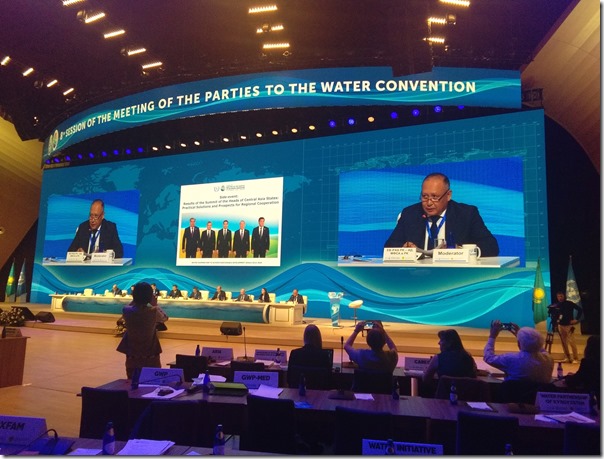On 19 November 2018, the Council of Foreign Affairs of the European Union (EU) adopted conclusions on water diplomacy
which promote accession and implementation of the Water Convention
.
The Council recalls that water is a prerequisite for human survival and dignity and a fundamental basis for the resilience of both societies and the environment. Water is vital for human nutrition and health, and essential for ecosystem management, agriculture, energy and overall planetary security.
The Council notes the potential of water scarcity to affect peace and security, as water related risks can have grave human and economic costs, all of which can have direct implications for the EU, including through migration flows. The Council intends to enhance EU diplomatic engagement about water as a tool for peace, security and stability, and firmly condemns the use of water as a weapon of war. The Council also underlines the EU’s commitment to promoting transboundary and integrated water management as well as effective water governance.
In much of the Middle East and North Africa, the combination of recurrent droughts cycles, physical water scarcity and poor water quality, armed conflict, forced displacement, poor water governance and weak institutional performance is contributing to a growing water crisis. In other cases, such as the Lake Chad basin or the Aral Sea, water sources have been dramatically shrinking and are expected to come under even more pressure due to unsustainable use or climate change impacts. Construction of large dams in international rivers such as the Nile or Mekong can contribute to tensions among riparian States and the wider affected areas. The EU is ready to support efforts to address these challenges, at the request of all the parties.
The Council reaffirms the EU’s commitment to the human right to safe drinking water and sanitation, as components of the right to an adequate standard of living. It underlines the EU’s strong commitment to the implementation of the UN 2030 Agenda and highlights that progress on Goal 6 (“Ensure availability and sustainable management of water and sanitation for all”) is essential for the achievement of other Sustainable Development Goals.
The Council stresses the essential link between water and climate change, and welcomes recent discussions at the UN Security Council linking water, climate, peace and security. The EU confirms its continued commitment to address water challenges around the world and to give the necessary consideration to the importance of water and sanitation in the programming of future financial and technical cooperation with partner countries.


